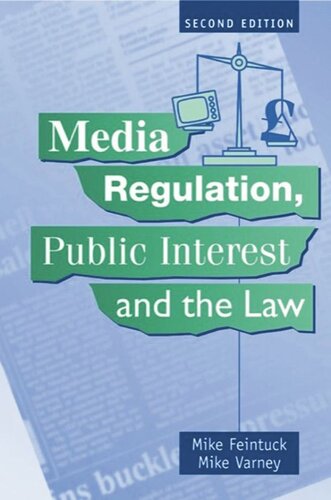

Most ebook files are in PDF format, so you can easily read them using various software such as Foxit Reader or directly on the Google Chrome browser.
Some ebook files are released by publishers in other formats such as .awz, .mobi, .epub, .fb2, etc. You may need to install specific software to read these formats on mobile/PC, such as Calibre.
Please read the tutorial at this link: https://ebookbell.com/faq
We offer FREE conversion to the popular formats you request; however, this may take some time. Therefore, right after payment, please email us, and we will try to provide the service as quickly as possible.
For some exceptional file formats or broken links (if any), please refrain from opening any disputes. Instead, email us first, and we will try to assist within a maximum of 6 hours.
EbookBell Team

0.0
0 reviewsRegulation of the media has traditionally been premised upon claims of 'the public interest', yet the term itself remains contested and generally ill defined. In the context of technological development and convergence, as well as corporate conglomeration, traditional 'public service' values in British broadcasting are challenged by market values. With such ongoing trends continuing apace, regulators must increasingly justify their interventions.
The communication industries' commercialisation and privatisation pose a fundamental threat to democratic values. Media Regulation, Public Interest and the Law argues that regulators will only successfully protect such values if claims associated with 'citizenship' are recognised as the rationale and objective for the regulatory endeavour.
While such themes are central to the book, this second edition has been substantially revised and updated, to take account of matters such as European Directives, the UK's Communications Act 2003, the process of reviewing the BBC's Charter, and relevant aspects of the reform of general competition law.
Key Features:
Praise for the First Edition:A detailed and critical assessment of the problems and confusions of recent media regulation in the UK including digital television franchising and the Broadcasting Complaints Commission… it is well organised, and should be a useful resource for more advanced students and academics…for updating the public regulation case with vigour and"